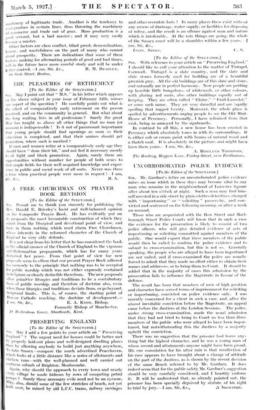• UNCORROBORATED POLICE EVIDENCE ITo the Editor of the SPECTATOR.]
Sin,-- Mr. Gardner's letter on uncorroborated police evidence raises an issue which in these days may become vital to any man who remains in the neighbourhood of Leicester Square after about ten o'clock at night. Such a man .may find him- self arrested in a side street by plain-clothes detectives, charged with " importuning " or " soliciting " passers-by, and con- victed and sentenced on the following morning, or after a week. on remand.
Those who are acquainted with the Bow Street and Marl- borough Street Police Courts will know that in such a ease the evidence for the prosecution is likely to consist of two police officers, who will give detailed evidence of acts of importuning or soliciting committed against members of the public. One would expect that these members of the public would then be called to confirm the police evidence and to submit to cross-examination, but this is not so. Generally speaking, the people who are alleged to have been importuned are not called, and if cross-examined the police are usually forced to admit that they made no effort either to obtain their. names and addresses, or to bring them to Court. It should be added that in the majority of eases this admission by the prosecution fails to influence the Magistrate in favour of the defence.
The result has been that numbers of men of high position and character have served terms of imprisonment for soliciting or importuning, convicted on police evidence only. I was recently concerned for a client in such a case, and, after the almost inevitable conviction before the Magistrate, an appeal came before the Justices at the London Sessions. The police, under strong cross-examination, made the usual admission that they had not tried to bring to Court no less than three members of the public who were alleged to have been impor- tuned, but notwithstanding this the Justices by a majority upheld the conviction.
There was no suggestion that the prisoner had borne any- thing but the highest character, and he was a young man of whose record and attainments anyone might have been proud. His one consolation for his utter ruin is that recollection of his ease appears to have brought about a change of attitude on the part of the Justices, as is shown by the recent decision of the same Bench referred to by Mr. Gardner. It does indeed seem that for the public safety Mr. Gardner's suggestion should be very carefully considered, and I heartily endorse it. It will be understood that, as already pointed out, the prisoner has been specially deprived by statute of his right
to trial by jury.—I am, Sir, &c., A SOLICITOR.






























































 Previous page
Previous page